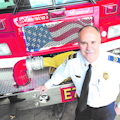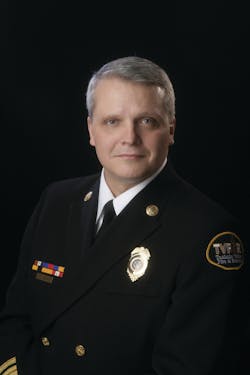Chief Jeff Johnson is the fire service representative appointed to the FirstNet board, which was legislated into place to build a nationwide public safety broadband network. This is a daunting task and all of the FirstNet board members have been working diligently to move this network forward. I caught up with Jeff at a regional FirstNet Outreach meeting and asked him to provide a retrospective view of his experience to date. Here it is.
Chief Jeffrey D. Johnson (ret.), CEO, EFO, MIFireE, is the chief executive officer of the Western Fire Chiefs Association and board member for the First Responders Network Authority (FirstNet). He is a past president of the International Association of Fire Chiefs (IAFC) and retired as fire chief and CEO of Oregon’s Tualatin Valley Fire & Rescue (TVF&R) following a 32-year fire service career. Johnson is nationally known as an innovator and ambassador for excellence in public safety through customer service and embracing technology and the science of the industry. He has written two fire service books and is a guest lecturer at events across the nation. In addition, he is chairman of the board of Emergency Services Consulting International (ESCi) and was Chairman of the Board of Informed Corp., which was sold to Ascend Learning in 2011. Johnson holds a bachelor of science degree in business and associates’ degrees in fire science and criminal justice administration.
In Jeff Johnson’s words:
I left home on May 14 and spent seven weeks on the road for FirstNet. Along the way, I hit five cities out of our six-stop tour to host regional meetings with every state and territory that will be part of FirstNet. We started in D.C. during Police Week, then on to Denver, San Francisco, St. Louis, Boston and Memphis. We spent a day and a half in each place with 80-90 governor-designated volunteers who were asked to begin an important dialogue with FirstNet.
We talked about their respective network requirements, priorities and concerns. And boy, are they different. We have to contend with roads closed eight months of the year in Alaska, waterways between islands in Hawaii and American Samoa and the overload in Kentucky at every college football and basketball game. As we assured workshop participants, FirstNet hasn’t designed the network yet. We can’t until we’ve consulted with states and territories and tribes to really understand their unique needs.
Craig Farrill, the acting CTO (chief technology officer) for FirstNet, shared our current thinking about our mandate to build the first nationwide high-speed broadband wireless network dedicated to public safety. FirstNet will be a public safety-grade network. More reliable, secure, resilient, hardened and ubiquitous – a first-of-its-kind network. Talk about inspiration for a guy like Craig who has spent 30 years building commercial networks worldwide!
During the workshops, we took the opportunity to bring a dose of reality to a few misperceptions that have been fueled by the rumor mill.
Some in the public safety community have been under the mistaken impression that FirstNet will completely control the network. It’s true that FirstNet will control the nationwide core portion, but when it comes to who gets access, what applications they can use or who has priority during incidents with multiple responders, control will be at the local level. The incident commander will take charge. Public safety will still manage devices and talk groups. It has to work that way. And the software-based LTE technology makes that possible.
So what will it cost to build and operate this network? Is $7 billion enough?
We don’t know, but that’s our working assumption. FirstNet has to create a business model that ensures the network is self-sustaining. We will charge fees to users to lease our spectrum, connect to our core and use our services. We plan to leverage as many existing state and federal assets as we can to keep costs down. There are more than 400,000 commercial and LMR (land mobile radio) sites as well as infrastructure from power companies and transportation networks that can potentially be used to build our new Band Class 14 network. Our other ace in the hole is to create public/private partnerships that help our dollars go farther.
Will it be possible for states to use FirstNet spectrum to generate revenue?
No. The law that created FirstNet requires all fees collected from the use of FirstNet spectrum to be reinvested to build, operate, maintain and improve the network. That said, if states contribute assets to FirstNet, the value of those assets will be factored in to our relationship. We are looking for a win/win here.
When will FirstNet replace LMR?
FirstNet can’t replace LMR until mission-critical voice for LTE (long-term evolution) is available. There’s no point guessing when that will happen. We’re still developing standards. We do know that FirstNet will launch with commercial-grade voice and mission-critical data services. Users will be able to send and receive video, images and text. They will have a more reliable and faster network for getting access to data and applications they need to do their jobs. Push-to-talk capability is in our launch plan too.
Practically speaking, FirstNet won’t replace LMR until users trust the network and see the value. At the end of the day, it’s really about adoption. Wouldn’t a combined pager and data device be compelling to volunteer firefighters? We want to create a moral imperative to use FirstNet. If we help you get better situational awareness and find injured firefighters in burning buildings, we believe public safety will switch.
For more news and training on technology and communications, visit: http://www.firehouse.com/topics/technology-communications.
About the Author

Charles Werner
CHARLES WERNER, who is a Firehouse contributing editor, is a 45-year veteran of public safety. He served with the Charlottesville, VA, Fire Department for 37 years, serving the past 10 years as chief. Following retirement, Werner served for two years as senior adviser and acting deputy state coordinator for the Virginia Department of Emergency Management. He has chaired: DHS SAFECOM Executive Committee; IAFC Technology Council; National Information Sharing Consortium; and DHS/White House Incident Management Information Sharing SubCommittee. Werner currently serves as the director of DroneResponders Public Safety Alliance, chair of the National Council on Public Safety UAS and chair of the Virginia Secure Commonwealth UAS Sub Panel.
